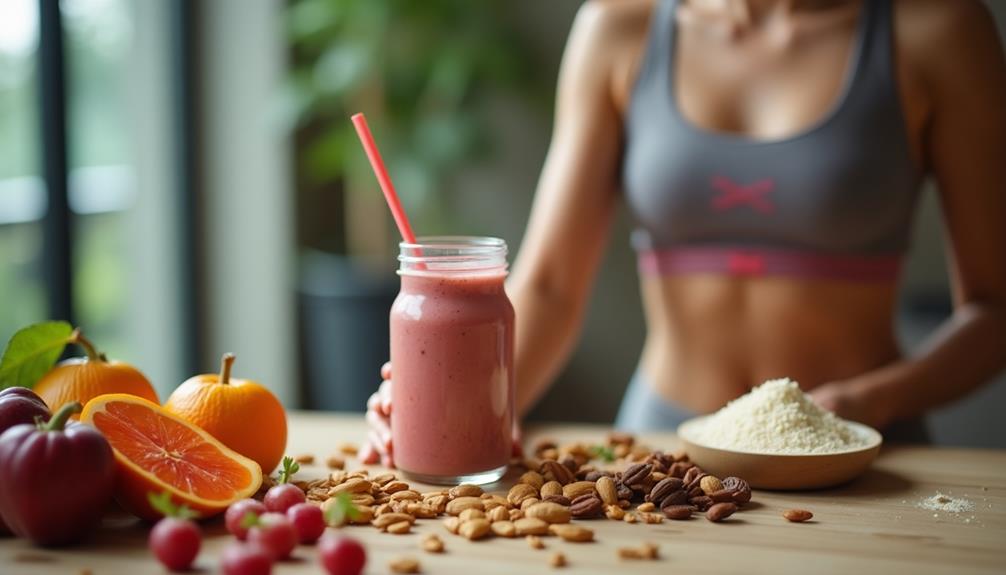To improve your protein intake after a workout, follow these three tips for success. First, choose high-quality protein sources like lean meats, dairy, or plant-based options. These provide the essential amino acids your body needs. Next, time your protein intake to within 30 to 60 minutes post-exercise, aiming for 20-30 grams to maximize recovery. Finally, incorporate protein-rich snacks such as Greek yogurt or protein bars, which are not only convenient but also effective for muscle growth. By focusing on these strategies, you can enhance your recovery process and overall performance, leading to better workout results ahead.
Core Insights
- Consume 20-30 grams of high-quality protein within 30 to 60 minutes post-exercise for optimal recovery.
- Incorporate protein-rich snacks like Greek yogurt or protein bars immediately after your workout.
- Prepare protein shakes or snacks in advance for convenience and to ensure timely intake.
- Combine protein with healthy carbohydrates to replenish energy and support muscle recovery.
- Plan meals around workout timing to consistently meet your post-exercise protein needs.
Choose High-Quality Protein Sources

When it comes to post-workout nutrition, selecting high-quality protein sources is essential for peak recovery and muscle growth. Focus on lean meats like chicken and turkey, which provide ample protein without excess fat. Fish, particularly fatty varieties like salmon, are rich in omega-3s, which help reduce inflammation. For those preferring plant-based options, organic vegan powders offer excellent protein content along with additional nutrients. These can include products made from peas, brown rice, and chia seeds, providing a complete amino acid profile.
Plant-based options, such as lentils, chickpeas, and quinoa, offer great protein while also providing fiber and essential nutrients. Dairy products like Greek yogurt or cottage cheese are excellent choices too, as they're packed with protein and calcium.
Opt for protein powders if you need a quick fix; just make sure they're from reputable brands. By prioritizing these sources, you'll support your body's recovery effectively and efficiently.
Timing Your Protein Intake

Best timing of your protein intake can greatly enhance recovery and muscle synthesis after workouts. Aim to consume protein within 30 to 60 minutes post-exercise. This window is pivotal because your muscles are primed to absorb nutrients, helping to repair and grow. Protein bars offer a convenient way to meet your post-workout protein needs, with many options providing 15-30g of protein per serving. These bars can be especially helpful when you're on-the-go or unable to prepare a full meal immediately after exercising.
Plan your meals accordingly. If you can't have a full meal right after your workout, preparing a protein shake or a snack in advance can be beneficial. Focus on getting around 20-30 grams of high-quality protein during this time.
Incorporate Protein-Rich Snacks

Incorporating protein-rich snacks into your post-workout routine can greatly boost your recovery efforts. After exercising, your muscles need protein to repair and grow stronger. Opt for snacks like Greek yogurt, cottage cheese, or a protein bar. These options are convenient and packed with essential nutrients. For those following a clean bulking plan, integrating these protein-rich snacks can be particularly beneficial in supporting muscle growth while maintaining a lean physique.
Consider timing as well. Eating a protein-rich snack within 30 minutes post-workout maximizes your recovery. You can also combine protein with healthy carbohydrates, like a banana with peanut butter, to replenish energy stores.
Keep your snacks simple and easy to prepare. This way, you'll be more likely to stick to your routine. By making protein-rich snacks a priority, you'll enhance your recovery and support your fitness goals effectively.
Frequently Asked Questions
What Are the Best Plant-Based Protein Options Post-Workout?
Think of plant-based proteins as nature's powerhouses. After your workout, grab lentils, chickpeas, quinoa, or hemp seeds. They'll fuel your recovery, support muscle growth, and keep you energized, proving that plants can pack a punch!
Can I Consume Protein Shakes on Non-Workout Days?
Absolutely, you can consume protein shakes on non-workout days. They're a convenient way to boost your daily protein intake, support muscle recovery, and maintain your nutritional goals, even when you aren't exercising. Enjoy them!
How Much Protein Do I Need for Muscle Recovery?
You need about 1.2 to 2.2 grams of protein per kilogram of body weight for best muscle recovery. Adjust your intake based on your activity level and personal fitness goals to maximize recovery effectively.
Are There Any Side Effects of Too Much Protein?
Picture your body as a finely-tuned machine; too much protein can cause it to sputter. You might experience digestive issues, kidney strain, or dehydration. Balance is key to keeping everything running smoothly and efficiently.
Should I Prioritize Protein Over Carbohydrates After Exercising?
After exercising, you should focus on a balanced intake. Protein helps repair muscles, but carbohydrates replenish energy. Prioritizing one over the other isn't ideal; instead, aim for a mix to support recovery effectively.

